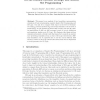Free Online Productivity Tools
i2Speak
i2Symbol
i2OCR
iTex2Img
iWeb2Print
iWeb2Shot
i2Type
iPdf2Split
iPdf2Merge
i2Bopomofo
i2Arabic
i2Style
i2Image
i2PDF
iLatex2Rtf
Sci2ools
130
click to vote
JELIA
2004
Springer
2004
Springer
On the Relation Between ID-Logic and Answer Set Programming
This paper is an analysis of two knowledge representation extensions of logic programming, namely Answer Set Programming and ID-Logic. Our aim is to compare both logics on the level of declarative reading, practical methodology and formal semantics. At the level of methodology, we put forward the thesis that in many (but not all) existing applications of ASP, an ASP program is used to encode definitions and assertions, similar as in ID-Logic. We illustrate this thesis with an example and present a formal result that supports it, namely an equivalence preserving translation from a class of ID-Logic theories into ASP. This translation can be exploited also to use the current efficient ASP solvers to reason on ID-Logic theories and it has been used to implement a model generator for ID-Logic.
Answer Set Programming | Artificial Intelligence | ID-Logic Theories | JELIA 2004 | Knowledge Representation Extensions |
Related Content
| Added | 02 Jul 2010 |
| Updated | 02 Jul 2010 |
| Type | Conference |
| Year | 2004 |
| Where | JELIA |
| Authors | Maarten Mariën, David Gilis, Marc Denecker |
Comments (0)

